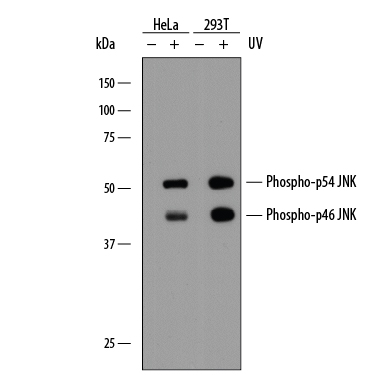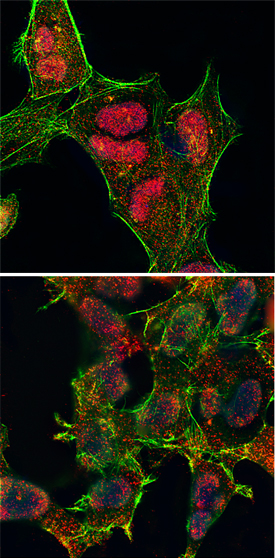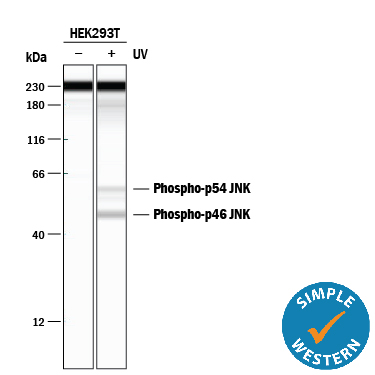Human/Mouse/Rat Phospho-JNK (T183/Y185) Antibody
Human/Mouse/Rat Phospho-JNK (T183/Y185) Antibody Summary
Applications
Please Note: Optimal dilutions should be determined by each laboratory for each application. General Protocols are available in the Technical Information section on our website.
Scientific Data
 View Larger
View Larger
Detection of Human and Mouse Phospho-JNK (T183/Y185) by Western Blot. Western blot shows lysates of HeLa human cervical epithelial carcinoma cell line and 293T human embryonic kidney cell line untreated (-) or treated (+) with 20 mJ/cm2ultraviolet light (UV) followed by a 30 minute recovery. PVDF membrane was probed with 1 µg/ml of Rabbit Anti-Human/Mouse/Rat Phospho-JNK (T183/Y185) Monoclonal Antibody (Catalog # MAB1205), followed by HRP-conjugated Anti-Rabbit IgG Secondary Antibody (Catalog # HAF008). Specific bands were detected for Phospho-JNK (T183/Y185) at approximately 46 and 54 kDa (as indicated). This experiment was conducted under reducing conditions and using Immunoblot Buffer Group 1.
 View Larger
View Larger
Phospho-JNK (T183/Y185) in HEK293 Human Cell Line. JNK phosphorylated at T183/Y185 was detected in immersion fixed HEK293 human embryonic kidney cell line untreated (lower panel) or treated with UV radiation (upper panel) using Rabbit Anti-Human/Mouse/Rat Phospho-JNK (T183/Y185) Monoclonal Antibody (Catalog # MAB1205) at 25 µg/ml for 3 hours at room temperature. Cells were stained using the NorthernLights™ 557-conjugated Anti-Rabbit IgG Secondary Antibody (red; Catalog # NL004) and counterstained with DAPI. Filamentous actin was stained with fluorescein-conjugated phalloidin (green). Specific staining was localized to nuclei. View our protocol for Fluorescent ICC Staining of Cells on Coverslips.
 View Larger
View Larger
Detection of Human Phospho-JNK (T183/Y185) by Simple WesternTM. Simple Western lane view shows lysates of HEK293T human embryonic kidney cell line untreated (-) or treated (+) with 20 J/m2ultraviolet light (UV) followed by a 30 minute recovery, loaded at 0.2 mg/mL. A specific band was detected for Phospho-JNK (T183/Y185) at approximately 46 and 56 kDa (as indicated) using 20 μg/ml of Rabbit Anti-Human/Mouse/Rat Phospho-JNK (T183/Y185) Monoclonal Antibody (Catalog # MAB1205). This experiment was conducted under reducing conditions and using the 12-230 kDa separation system. Non-specific interaction with the 230 kDa Simple Western standard may be seen with this antibody.
Reconstitution Calculator
Preparation and Storage
- 12 months from date of receipt, -20 to -70 degreesC as supplied. 1 month, 2 to 8 degreesC under sterile conditions after reconstitution. 6 months, -20 to -70 degreesC under sterile conditions after reconstitution.
Background: JNK
The c-Jun N-terminal Kinases (JNKs) are part of the MAPK (mitogen-activated protein kinase) system that transmits signals from the extracellular milieu to both the cytoplasm and nucleus of the cell. Following perturbation at the cell membrane, MEKKs/MAP3Ks are initially activated, followed by their activation of MKKs/MAP2Ks, and MKKs activation of MAPKs/MAP(1)Ks. There are three classes of MAPKs: ERKs, p38 Kinases and JNKs. JNKs are 45-55 kDa protein products of three genes which, through alternative splicing, generate up to 10 possible isoforms. The phosphorylation targets for MAPKs vary, but include p53, c-MYC, ATF2 and c-Jun, the latter molecule representing the namesake for the enzyme group. The three human JNKs share approximately 80% aa sequence identity. JNKs from human, mouse and rat all contain a conserved Met-Met-Thr(183)-Pro-Tyr(185)-Val-Val motif that undergoes dual phosphorylation by MMK4 and MMK7 to activate the different JNKs. Activated by environmental stresses and inflammatory cytokines, JNKs translocate to the nucleus where they regulate the activity of several transcription factors; including the c-Jun component of AP-1 and ATF-2.
Product Datasheets
Citations for Human/Mouse/Rat Phospho-JNK (T183/Y185) Antibody
R&D Systems personnel manually curate a database that contains references using R&D Systems products. The data collected includes not only links to publications in PubMed, but also provides information about sample types, species, and experimental conditions.
3
Citations: Showing 1 - 3
Filter your results:
Filter by:
-
Evolutionary analysis of p38 stress-activated kinases in unicellular relatives of animals suggests an ancestral function in osmotic stress
Authors: V Shabardina, PR Charria, GB Saborido, E Diaz-Mora, A Cuenda, I Ruiz-Trill, JJ Sanz-Ezque
Open Biology, 2023-01-18;13(1):220314.
Species: Capsaspora owczarzaki
Sample Types: Cell Lysates
Applications: Western Blot -
ACPA decreases non-small cell lung cancer line growth through Akt/PI3K and JNK pathways in vitro
Authors: Ö Boyac?o?lu, E Bilgiç, C Varan, E Bilensoy, E Nemutlu, D Sevim, Ç Kocaefe, P Korkusuz
Cell Death & Disease, 2021-01-11;12(1):56.
Species: Human
Sample Types: Cell Lysates
Applications: Western Blot -
Isolation, structural elucidation and immuno-stimulatory properties of polysaccharides from Cuminum cyminum
Authors: M Tabarsa, S You, K Yelithao, S Palanisamy, NM Prabhu, M Nan
Carbohydr Polym, 2019-11-18;230(0):115636.
Species: Mouse
Sample Types: Cell Lysates
Applications: Western Blot
FAQs
No product specific FAQs exist for this product, however you may
View all Antibody FAQsReviews for Human/Mouse/Rat Phospho-JNK (T183/Y185) Antibody
Average Rating: 5 (Based on 2 Reviews)
Have you used Human/Mouse/Rat Phospho-JNK (T183/Y185) Antibody?
Submit a review and receive an Amazon gift card.
$25/€18/£15/$25CAN/¥75 Yuan/¥2500 Yen for a review with an image
$10/€7/£6/$10 CAD/¥70 Yuan/¥1110 Yen for a review without an image
Filter by:










